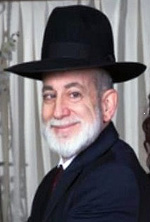By Rabbi Yaakov Marks

When we look deeper into the meaning of Yaakov’s and Esav’s words and actions, we see that they are debating two diametrically opposing world views, each representing the basic way in which a person could choose to live his life. In effect, everybody is confronted with choosing which path to take. They are forced to make a clear choice; these two ways of viewing the world cannot coexist within one person.
Esav said ‘I have a lot’. Esav was implying that even though he had more than almost anybody in the world, he was still seeking more. Even though he had more money and physical possessions than it was possible for him to use in his lifetime, he constantly longed for more. Esav’s need to increase his fortune was insatiable; he spent his life in pursuit of pleasure and fortune. Even though Esav refused to take the gift, the careful reader can see that the initial rejection of the gift was a facade because he took it in the end. Esav would not pass up any opportunity to increase his fortune. Indeed, Esav spent so much time and effort acquiring possessions that he never had time to enjoy and savor what he worked so hard to attain.
Yaakov said ‘I have all I need’. Yaakov was telling Esav that he evaluated what he needed, he worked for that amount, and all the rest of his possessions which G-d gave him were used to help others. Yaakov was not tempted to chase after the riches and pleasures of the world. In contrast to his twin Esav, Yaakov only focused on his needs, on opportunities to help others, and to rightfully earn his possessions. He had genuine peace of mind and was, therefore, able to enjoy and appreciate all that G-d had given him.
I have witnessed many times when a beautiful and a plentiful array of food is set out for people to enjoy, that people will react because of these two philosophies. Some guests will comment on how wonderful and delicious the food was, even though they had tasted only a small sample of some of the food. Others will complain that they were very disappointed because they didn’t have enough time to eat all of the assorted foods available. Even though they ate almost every delicacy offered, they couldn’t enjoy what they ate because they were focused on the few things they didn’t eat.
Yaakov refused Esav’s escort because he understood the tremendous influence Esav’s lust for wealth and desire for possessions and pleasure would have on his children. Esau’s way of life could be very tempting for someone who doesn’t understand the harm that instant gratification could bring. Yaakov understood human nature and the difficulty of fighting such temptation. It is often difficult to understand that saying no to eating something or stopping to eat when a person is full brings more and longer lasting pleasure than over indulging in the eating of tasty food.
Yaakov focused only on what he needed and could be at peace with himself and appreciate all he had been given. Thus, he was a fulfilled person. Esav, on the other hand, never felt satisfied with what he had, so how could he enjoy his life?
It is necessary for us to contemplate how we want to live our lives. Do we want to enjoy what we have, like Yaakov or do we want to envy what we don’t have and not enjoy what we do have, like Esav? Will we eat only what we need to and enjoy our food or will we overindulge and end up regretting what we ate?
May we have the wisdom and strength to understand what we truly need, work faithfully for it, and be blessed, like Yaakov, to enjoy and appreciate the important things in our lives. With this attitude, we will be blessed to live a life of pleasure without regret.
*
Rabbi Marks is a life and health coach, who may be contacted via ahealthyrabbi@gmail.com.